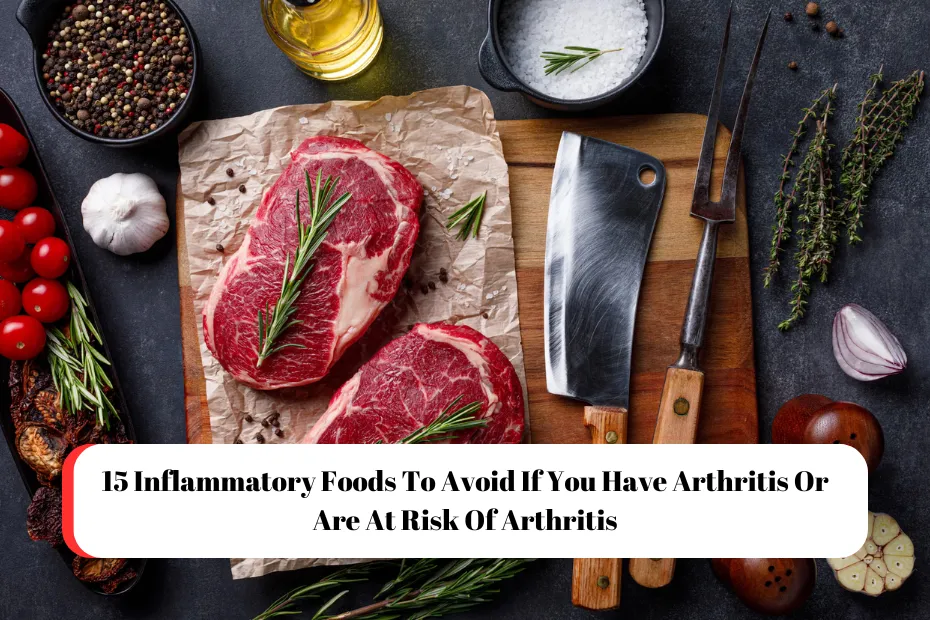If you have arthritis or are at risk of developing it, the foods you eat play a crucial role in managing inflammation and joint pain. Arthritis, characterized by inflammation of the joints, can cause stiffness, swelling, and discomfort, which can be worsened by certain foods. Many common foods in our diet can trigger inflammatory responses, leading to flare-ups and worsening symptoms.
To help alleviate arthritis-related pain, it’s essential to be mindful of your diet and avoid foods that can exacerbate inflammation. In this blog, we’ll explore 15 inflammatory foods to avoid if you have arthritis or are at risk of arthritis, helping you make healthier choices to manage symptoms and improve your overall well-being.
1. Processed Sugars
Processed sugars are highly inflammatory and can contribute to the worsening of arthritis symptoms. When consumed, sugars stimulate the release of pro-inflammatory molecules called cytokines. Common sources of processed sugars include candy, soda, pastries, and other sweets.
These sugars also trigger the body to release more insulin, which in turn can lead to weight gain a significant risk factor for arthritis, particularly osteoarthritis. Excess weight puts additional pressure on joints, especially the knees, hips, and lower back, causing more pain and inflammation. Reducing sugar intake can help lower inflammation levels and improve overall joint health.
2. Trans Fats
Trans fats, found in many processed and fried foods, are notorious for their inflammatory properties. These fats are often used in fast food items, margarine, and packaged snacks to extend shelf life. However, they have been shown to trigger systemic inflammation, which can exacerbate arthritis symptoms.
Trans fats not only contribute to chronic inflammation but also increase levels of bad cholesterol (LDL) and decrease levels of good cholesterol (HDL), leading to an increased risk of heart disease. For individuals with arthritis, avoiding foods that contain trans fats is essential to managing inflammation and joint pain effectively.
3. Refined Carbohydrates
Refined carbohydrates, such as white bread, pasta, and many cereals, are stripped of fiber and essential nutrients, leaving only quick-digesting sugars. These foods cause rapid spikes in blood sugar levels, which can contribute to inflammation. For people with arthritis, especially rheumatoid arthritis, this inflammation can worsen joint stiffness and pain.
Moreover, refined carbs are linked to obesity, which further strains weight-bearing joints. Replacing refined carbs with whole grains like brown rice, quinoa, and whole wheat products can help stabilize blood sugar levels and reduce inflammation in the body.
4. Red and Processed Meats
Red and processed meats like beef, pork, sausages, and bacon contain high levels of saturated fats and advanced glycation end products (AGEs). AGEs are toxins that form when proteins or fats combine with sugar in the bloodstream, which can promote inflammation. Studies have shown that consuming high amounts of red meat increases inflammatory markers in the body, making arthritis symptoms worse.
For people at risk of arthritis or those already suffering from the condition, reducing red meat consumption and opting for lean proteins like chicken, fish, and plant-based alternatives can make a significant difference in reducing inflammation.
5. Dairy Products
Dairy products, particularly those high in fat like whole milk, cheese, and butter, can trigger inflammation in some people with arthritis. This is especially true for individuals who are sensitive to casein, the protein found in dairy, which can irritate the tissues around joints.
While dairy provides calcium and vitamin D, which are essential for bone health, some arthritis patients find that eliminating or reducing dairy in their diet helps alleviate joint pain and stiffness. Non-dairy alternatives such as almond milk, soy yogurt, and plant-based cheeses can be excellent substitutes that don’t contribute to inflammation.
6. Alcohol
Excessive alcohol consumption can exacerbate arthritis symptoms by increasing levels of inflammation in the body. Alcohol is metabolized by the liver, which plays a key role in maintaining the balance of inflammatory and anti-inflammatory substances in the body. When alcohol is consumed in excess, it can disrupt this balance and lead to an increase in pro-inflammatory cytokines.
Additionally, alcohol dehydrates the body and reduces its ability to fight off inflammation. For those with arthritis, it’s advisable to limit alcohol intake, as frequent consumption may worsen joint pain and contribute to the progression of the disease.
7. Gluten
Gluten, a protein found in wheat, barley, and rye, can be particularly problematic for individuals with gluten sensitivity or celiac disease. While not everyone with arthritis is sensitive to gluten, some studies suggest that gluten may contribute to inflammation in certain individuals, particularly those with autoimmune conditions like rheumatoid arthritis.
For these individuals, consuming gluten can lead to increased joint pain, swelling, and stiffness. Eliminating or reducing gluten-containing foods from the diet and opting for gluten-free grains such as quinoa, buckwheat, and amaranth may help reduce inflammation and improve joint function.
8. Omega-6 Fatty Acids
While omega-6 fatty acids are essential for the body in small amounts, an imbalance between omega-6 and omega-3 fatty acids can lead to inflammation. Omega-6 fatty acids are found in oils such as corn, sunflower, safflower, and soybean oil, which are commonly used in processed foods and restaurant meals.
A high intake of omega-6s without sufficient omega-3s can promote the production of inflammatory chemicals in the body, worsening arthritis symptoms. To combat this, individuals should focus on increasing their intake of omega-3-rich foods like fatty fish, flaxseeds, and walnuts to restore balance and reduce inflammation.
9. Artificial Additives and Preservatives
Artificial additives and preservatives found in processed and packaged foods can contribute to inflammation and worsen arthritis symptoms. Ingredients such as monosodium glutamate (MSG), artificial sweeteners, and food colorings have been linked to inflammatory responses in the body.
These chemicals can trigger immune reactions and increase oxidative stress, which exacerbates joint pain and stiffness. For those with arthritis, it’s important to read food labels carefully and avoid products that contain these additives. Choosing whole, unprocessed foods can help minimize exposure to these inflammatory agents and support overall joint health.
10. Salt
Excess salt in the diet can lead to water retention, which increases pressure on the joints and exacerbates arthritis symptoms. Sodium is also known to stimulate the inflammatory processes in the body, making it a key food item to limit for those with arthritis. Many processed foods, canned soups, and frozen meals are loaded with sodium, contributing to high daily intake levels.
Reducing salt by choosing fresh, whole foods and cooking meals at home can help lower inflammation and alleviate joint pain. Additionally, using herbs and spices as flavoring alternatives can add taste without the inflammatory effects of salt.
11. High-Fat Foods
Foods high in unhealthy fats, particularly saturated and trans fats, can increase inflammation and worsen arthritis symptoms. These fats are commonly found in fast food, fried foods, processed snacks, and baked goods. Saturated fats, found in red meat, butter, and cheese, can trigger the release of adipokines, which are inflammatory proteins produced by fat tissue.
These adipokines can worsen inflammation in the joints, leading to more pain and stiffness. Replacing unhealthy fats with healthier options such as olive oil, avocados, and nuts can help reduce inflammation and promote better joint health.
12. Fried Foods
Fried foods, especially those fried in unhealthy oils like vegetable oil or hydrogenated fats, can trigger inflammation due to their high levels of trans fats and AGEs. The process of frying at high temperatures creates harmful compounds that are difficult for the body to process, leading to increased oxidative stress and inflammation.
For individuals with arthritis, consuming fried foods can aggravate symptoms by promoting inflammatory responses in the body. Instead of fried foods, baking, steaming, or grilling can be healthier cooking methods that reduce inflammation and improve overall well-being.
13. Nightshade Vegetables
Nightshade vegetables, such as tomatoes, peppers, potatoes, and eggplants, contain a chemical compound called solanine, which may trigger inflammation in some people. While nightshades are rich in nutrients, for certain individuals with arthritis, they can cause joint pain and stiffness.
However, not everyone with arthritis is sensitive to nightshades, and their impact can vary from person to person. Some people may benefit from eliminating nightshade vegetables from their diet to see if symptoms improve, while others can continue to enjoy these vegetables without issue.
14. Corn Oil
Corn oil is a common cooking oil that is high in omega-6 fatty acids, which, as mentioned earlier, can contribute to inflammation when consumed in excess. The imbalance between omega-6 and omega-3 fatty acids in the typical Western diet can promote the production of inflammatory molecules.
Corn oil is often used in processed and fried foods, making it a hidden source of inflammation for those with arthritis. Opting for healthier oils, such as olive oil or avocado oil, which are rich in anti-inflammatory omega-3s, can help reduce inflammation and improve joint health.
15. Aspartame
Aspartame, an artificial sweetener commonly found in diet sodas, sugar-free snacks, and low-calorie products, has been linked to inflammatory reactions in some individuals. Aspartame is a chemical that can trigger immune responses, leading to increased inflammation and aggravating arthritis symptoms in susceptible people.
Although the connection between aspartame and inflammation is still being studied, some individuals with arthritis report feeling better after cutting artificial sweeteners from their diet. Replacing aspartame with natural sweeteners like stevia or consuming less processed foods can help reduce inflammation and support better joint health.
Conclusion
Managing arthritis through diet is an effective way to reduce inflammation and ease joint pain. By avoiding these 15 inflammatory foods, you can take control of your symptoms and support your joint health. Small dietary changes can make a big difference in managing arthritis.
FAQs
1. What foods should be avoided if you have arthritis?
Avoid foods like processed sugars, trans fats, refined carbs, and red meats, as they can trigger inflammation and worsen arthritis symptoms.
2. How does sugar affect arthritis?
Processed sugars increase inflammation by triggering cytokine production, leading to more pain and joint stiffness for those with arthritis.




